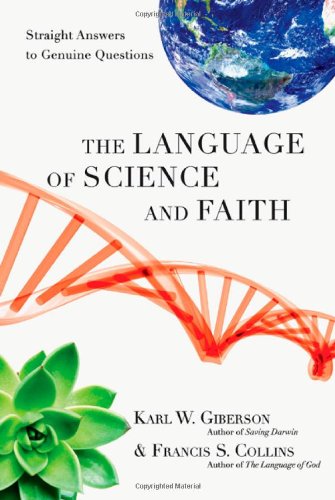Book Review: The Language of Science and Faith
The Language of Science and Faith:
Straight Answers to Genuine Questions
by Karl W. Giberson, Francis S. Collins
Review by Michael Gulker
The raw material for this book originated from a set of “Frequently Asked Questions” Francis Collins responded to after publishing his Language of God: A Scientist Presents Evidence for Belief. These FAQs became the core of the BioLogos website, the perspective that life (Bio) evolves by the ordering wisdom of God (Logos), and this ordering wisdom, when uncovered by science, rightly leads to praise. Giberson translated these FAQs into a coherent, readable narrative that creates a public space for evangelicals who are also evolutionary creationists to argue for the essential harmony between faith and science.
The authors presume that the faith/science controversy results largely from a few loud atheists who misconstrue “science” as inherently “anti-religious,” and a few loud Christians who misconstrue “faith” as “anti-science.” The authors proclaim the good news that their book disproves both groups and “the negative baggage of evolution can be tossed overboard without harm to the faith.” The structure of the book, which opens and closes with worship, models its ultimate goal as it seeks to remove scientific and theological stumbling blocks that exclude evangelicals from worshipful participation in the “richest appreciation of creation.”
The book begins with issues of evolution and the age of the earth, leading to the philosophical and theological questions engaged in the following six chapters. Chapter 1 asks what many evangelicals feel to be the central question in the faith and science debate, namely, “Do I Have to Believe in Evolution?” In answering that question, the authors may have missed an opportunity to open a dialogue about the question itself and why its enduring nature might prove significant theologically.
The authors presume an ancient earth and remind the reader, “A mountain of scientific data supports the idea that the earth is around 4.5 billion years old” and ask how it is then that so many evangelical Christians refuse to believe it. Giberson and Collins suggest, “Young earth creationists often appear to be reading an anti-evolutionary agenda into the Bible and forcing it to fit assumptions they bring to the text.” The authors confess that “God’s revelation in nature, studied by science, should agree with God’s revelation in Scripture, studied by theology. Since revelation from science is so crystal clear about the age of the earth, we believe we should think twice before embracing an approach to the Bible that contradicts this revelation.”
Aware they have opened a serious can of worms, Giberson and Collins engage a different set of questions: What exactly is the relationship between science and religion? If God’s two revelations cannot be at odds, how are they to be reconciled? What can we say and not say about God? Why is Darwin’s theory so controversial? And finally, what about evolution and human beings? Can humans be both specially created in the image of God and simultaneously share a common ancestry with all other living organisms on earth?
The authors attempt to answer these questions with admirable grace and scientific expertise. Of particular significance is their effort to relate scientific and scriptural truth through the incarnation of Jesus, who enters into the natural order without violating it. It is at this point where they depart from the deist, materialist metaphysics so troublingly ubiquitous in faith and science debates, embracing instead the exciting Christological conception of creation that provides a confessional grounding capable of adequately holding faith and science together.
Since the language of science and the language of faith are indeed always in flux, then it will require discernment of experts in both languages, guided by the Holy Spirit of truth and the sense of the faithful, to incorporate into the faith new historical experience and new scientific discoveries in ways that build up love of God and love of neighbor. Collins and Giberson are to be commended for the great service of generously sharing how they have integrated their confession and their profession. They have opened a public space for evangelical scientists to raise questions about how to integrate the language of science and the language of faith.

